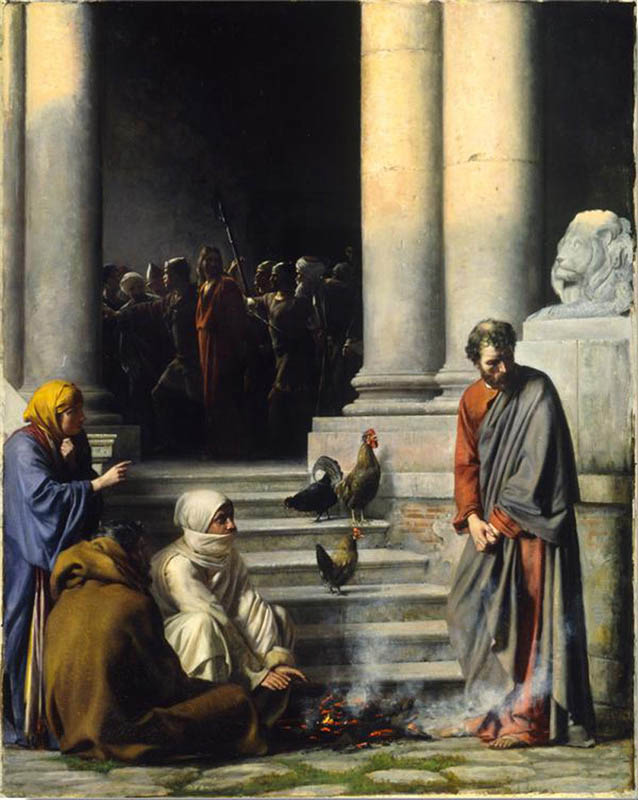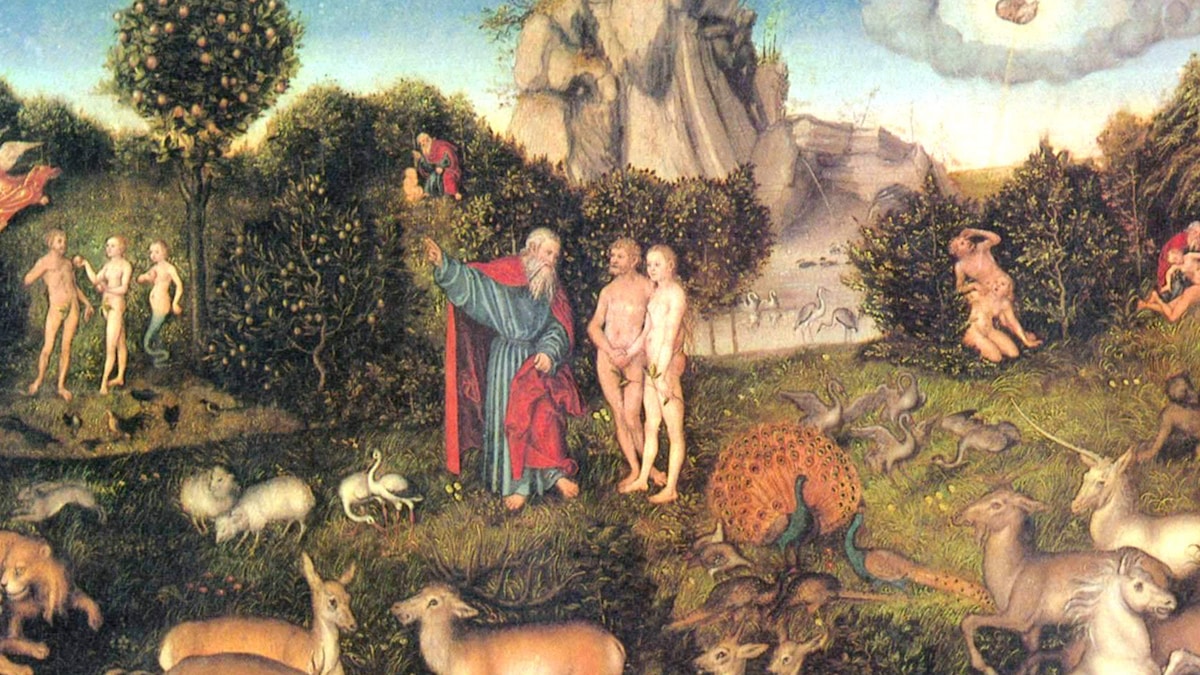 One summer a nine-year-old boy named Johnny, and his twin sister Sally, were visiting their grandparents’ farm for a week. Johnny was given a slingshot to play with, and late one morning he went out into the woods to practice—but no matter how hard he tried, he could never hit the target. Feeling discouraged, he started heading back to the house for lunch, but on the way he saw one of his grandmother’s pet ducks. Just for the heck of it, he put a stone in the slingshot and let it fly—and wouldn’t you know, it struck the duck squarely in the head, killing it instantly. Johnny was horrified, and in his panic, he hid the dead duck in the woodpile—only to notice his sister watching him. Sally didn’t say anything. However, after lunch, when the grandmother asked her to help clean up the kitchen, Sally said, “Grandma, Johnny told me he wanted to help you in the kitchen today. Right, Johnny?,” and then she whispered to him, “Remember the duck!” The blackmail worked, and Johnny ended up doing the dishes. Later the grandfather asked if the children would like to go fishing with him, but his wife said, “Oh, but I need Sally to help me make dinner.” Once again Sally spoke right up, saying, “But Johnny said he wanted to help,” while whispering to her brother, “Remember the duck!” And so Sally went fishing while her brother was trapped in the kitchen.This went on for several days; Johnny was doing his own chores and his sister’s, too. Finally he couldn’t take it anymore, so he went to his grandmother and confessed what had happened. To his surprise, she hugged him and said, “Johnny, I already know. I was standing at the kitchen window and saw the whole thing. Because I love you, I forgave you as soon as it happened—but I was wondering how long you were going to let Sally make a slave out of you” (Bausch, 60 More Seasonal Homilies, p. 72). Because of shame, embarrassment, and self-disgust, we can sometimes be our own worst enemies, setting ourselves up for unnecessary suffering and punishment—but it doesn’t have to be that way. Jesus doesn’t want any of us to be prisoners of guilt, and His ability to free us from our sins is a central part of the Easter message.
One summer a nine-year-old boy named Johnny, and his twin sister Sally, were visiting their grandparents’ farm for a week. Johnny was given a slingshot to play with, and late one morning he went out into the woods to practice—but no matter how hard he tried, he could never hit the target. Feeling discouraged, he started heading back to the house for lunch, but on the way he saw one of his grandmother’s pet ducks. Just for the heck of it, he put a stone in the slingshot and let it fly—and wouldn’t you know, it struck the duck squarely in the head, killing it instantly. Johnny was horrified, and in his panic, he hid the dead duck in the woodpile—only to notice his sister watching him. Sally didn’t say anything. However, after lunch, when the grandmother asked her to help clean up the kitchen, Sally said, “Grandma, Johnny told me he wanted to help you in the kitchen today. Right, Johnny?,” and then she whispered to him, “Remember the duck!” The blackmail worked, and Johnny ended up doing the dishes. Later the grandfather asked if the children would like to go fishing with him, but his wife said, “Oh, but I need Sally to help me make dinner.” Once again Sally spoke right up, saying, “But Johnny said he wanted to help,” while whispering to her brother, “Remember the duck!” And so Sally went fishing while her brother was trapped in the kitchen.This went on for several days; Johnny was doing his own chores and his sister’s, too. Finally he couldn’t take it anymore, so he went to his grandmother and confessed what had happened. To his surprise, she hugged him and said, “Johnny, I already know. I was standing at the kitchen window and saw the whole thing. Because I love you, I forgave you as soon as it happened—but I was wondering how long you were going to let Sally make a slave out of you” (Bausch, 60 More Seasonal Homilies, p. 72). Because of shame, embarrassment, and self-disgust, we can sometimes be our own worst enemies, setting ourselves up for unnecessary suffering and punishment—but it doesn’t have to be that way. Jesus doesn’t want any of us to be prisoners of guilt, and His ability to free us from our sins is a central part of the Easter message.
Have you ever sinned against someone so terribly, or messed up a relationship so badly, that even though the other person sincerely forgave you, you still felt guilty and uncomfortable in his or her presence? That’s surely how Peter must have felt in regard to his sin of denying Jesus three times. Jesus had forgiven him when He appeared to the apostles on Easter Sunday, but even so, Peter must have been haunted by embarrassment and shame. After all, Jesus had called him the Rock, and appointed him as leader of the Twelve and head of the Church, and he himself had insisted he would lay down his life for his Master—and yet he had ended up cowardly denying Him. Peter was still imprisoned in guilt; that may have been part of the reason he went fishing back in his homeland of Galilee: to get his mind off the thoughts that were oppressing him. Jesus, of course, fully understood this, and He responded to the apostle’s need. Not only did He demonstrate His acceptance of Peter and the others by serving them in a very practical way by preparing a meal for them; He also specifically gave Peter the chance to erase his three denials by making three expressions of love. To each of Peter’s expressions of love, however, the Lord responded with a command: “Feed My sheep.” In other words, we must show that our love for Jesus, and our acceptance of His mercy, is real—and we do this by living out our faith and sharing the Gospel whenever the opportunity arises.
As we see in the 1st Reading, Peter and the other apostles mastered this lesson; through the Holy Spirit, they had the strength and courage to proclaim the Gospel in spite of the anger and opposition of the religious authorities, and were even willing to suffer for the Name of Jesus. The 2nd Reading from the Book of Revelation describes Jesus as the Lamb Who was slain, and Who is worthy of receiving eternal praise and glory from all creation. One of the ways we take part in this universal hymn of praise is by trusting in Christ’s mercy and sincerely believing that when we ask His forgiveness, our sin and guilt is removed and taken away forever.
Many people grew up with an image of God as an angry Judge, just looking for a reason to smite anyone stepping out of line. While it’s true that there will be a day of reckoning and that Divine Justice must be satisfied, it’s even more true to say that God is eager to forgive us and restore us to grace, as long as we give Him the slightest opportunity to do so. Jesus didn’t undergo His fearful passion and death in order to have an excuse to turn around and wreak vengeance on His enemies, but so that sinners might be saved—and that includes each one of us, no matter how numerous or disgusting our sins might be. The Lord does not want us to be imprisoned in fear or guilt; all He wants is that we ask for His mercy, just as Johnny’s grandmother was merely waiting for him to come and confess what had happened. Our heavenly Father loves us from all eternity, and instantly forgives our sins; we simply have to ask for His mercy, in all humility and sincerity—and then let go of our guilt and fear in a spirit of trust.
Most of us probably already know and believe this—but there may be someone here thinking, “Well, that may be true for everyone else, but not for me,” or “That sounds too easy or too good to be true.” To such persons, I say: Yes, God’s mercy does include you; there are no exceptions—His ability and desire to forgive far surpasses even your most revolting and inexcusable sins. If Jesus could lovingly and completely forgive Peter’s terrible denials, He will certainly do just as much for you. All of us are called to believe in and accept this merciful love, and then do our best to show it to others. We should never be like Johnny, who was afraid to confess his sins, and we should certainly never be like Sally, who used her brother’s sin as an opportunity to blackmail him. Instead, we must be like the grandmother who reassured her grandson of her love and forgiveness. Guilt, shame, and fear will forever torment those souls who’ve condemned themselves to an eternity in hell, but there is no room for these things in heaven—and for as long as we’re alive here on earth, each time we confess and receive God’s mercy, these things must also be banished from our hearts.








